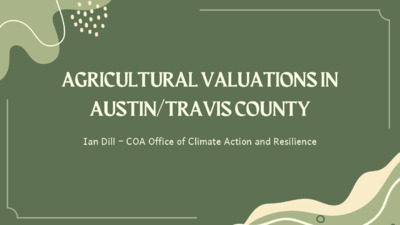Item 3. Agricultural Valuations, Ian Dill - June 2025 — original pdf
Backup

AGRICULTURAL VALUATIONS IN AUSTIN/TRAVIS COUNTY Ian Dill - COA Office of Climate Action and Resilience Background Travis Central Appraisal District (TCAD) creates the criteria for Agricultural Valuations based on primary use and property history. The State Comptroller releases guidelines for all Texas counties based on 1966 and 1978 Constitutional Amendments. Properties must pass 3 tests to qualify: “Principal Use” Test “Degree of Intensity” Test Time Period Test TCAD Structure TCAD has a big Board of Directors which is elected and run by a Chief Appraiser The Director appoints the Agricultural Appraisal Advisory Board, at least 2 of which are recipients of an Agricultural Exemption This has no decision-making authority over Exemptions! They advise on intensity standards Any issues with specific appraisals are handled by the Appraisal Review Board Appraisal Review Board members are private citizens appointed by TCAD Defining the Problem 3 main problems with Agricultural Valuations in Travis County: Agricultural Valuations ought to help stop the loss of Travis County Farmland. 1. Farmers in Austin/Travis County have trouble getting an exemption. 2. Not well aligned with goals in the Food Systems Plan. 3. Conspicuous properties are receiving valuations for land on or around large developments. Travis County has lost 11% of its farmland acreage and 21% of its farms since 2017. Average farm size has grown by 13% since 2017. Properties receiving a 1-d-1 exemption in the City of Austin (2023) 1-d-1 --- Open Space Agricultural Use (Dry Cropland, Pasture) 1-d-1B --- Beekeeping 1-d-1E --- Ecological Lab 1-d-1W --- Wildlife Conservation Barriers to Farmer Accesss The guidelines offer no way to measure intensity for a huge share of our crop mix! As of 2022, $14 million in crop sales out of the total $63 million are vegetables, melons, potatoes, sweet potatoes, nurseries, greenhouses, floriculture, or sod. Negotiations and challenges to appraisal process are complex and time-consuming. Food Systems Plan Alignment Stated Goals The Food Systems Plan (2024) aims for a diverse food inventory (Goal 4) and support regenerative food production (Goal 1). Assessment Process Assessors seem to take a snapshot of farms which misleads them about the intensity and farming techniques being used. Program-Wide Trends Even if only farms or conservation lands get exempted, the fact that the largest exempted properties are attached to a new factory and a racetrack indicate that the program is currently a development incentive. Recommendations - TCAD 1. Update and clarify intensity and size guidelines with special attention to organic, regenerative, and crop diverse methods. 2. Ensure that tax assessors work closely with farmers to develop knowledge of regenerative, organic, and otherwise diverse crop systems. 3. Clarify language excluding urban parcels based on municipal service provision. 4. Reflect the language of the Austin Climate Equity Plan by training tax assessors to allow regenerative agricultural practices. Recommendations - State of Texas 1.Greater clarity in guideline documents regarding: a.Which municipal services are disqualifying b.Whether properties partially within Austin retain eligibility c.Whether gaining municipal service access can result in the rollback tax and loss of exemption status. 2.Clear Language and support for diverse and regenerative cropping systems.